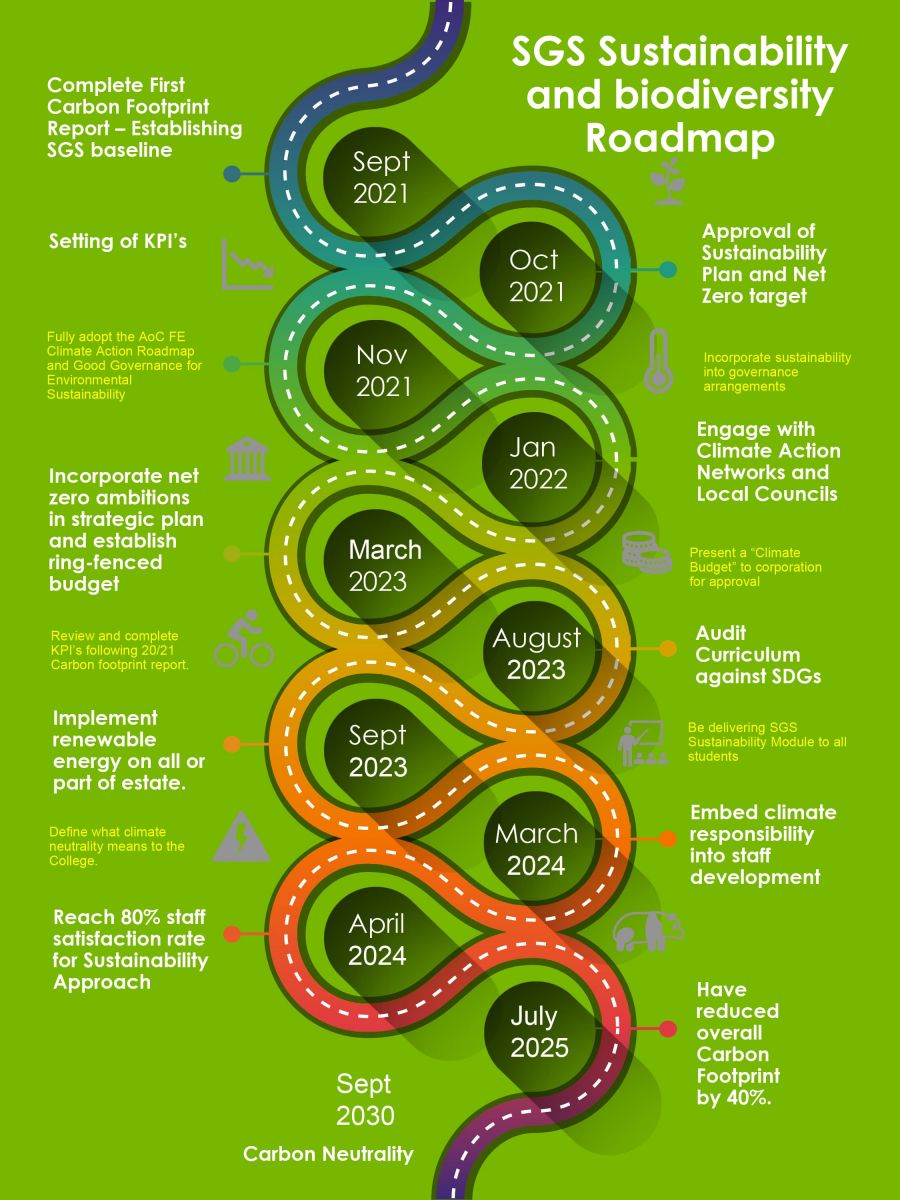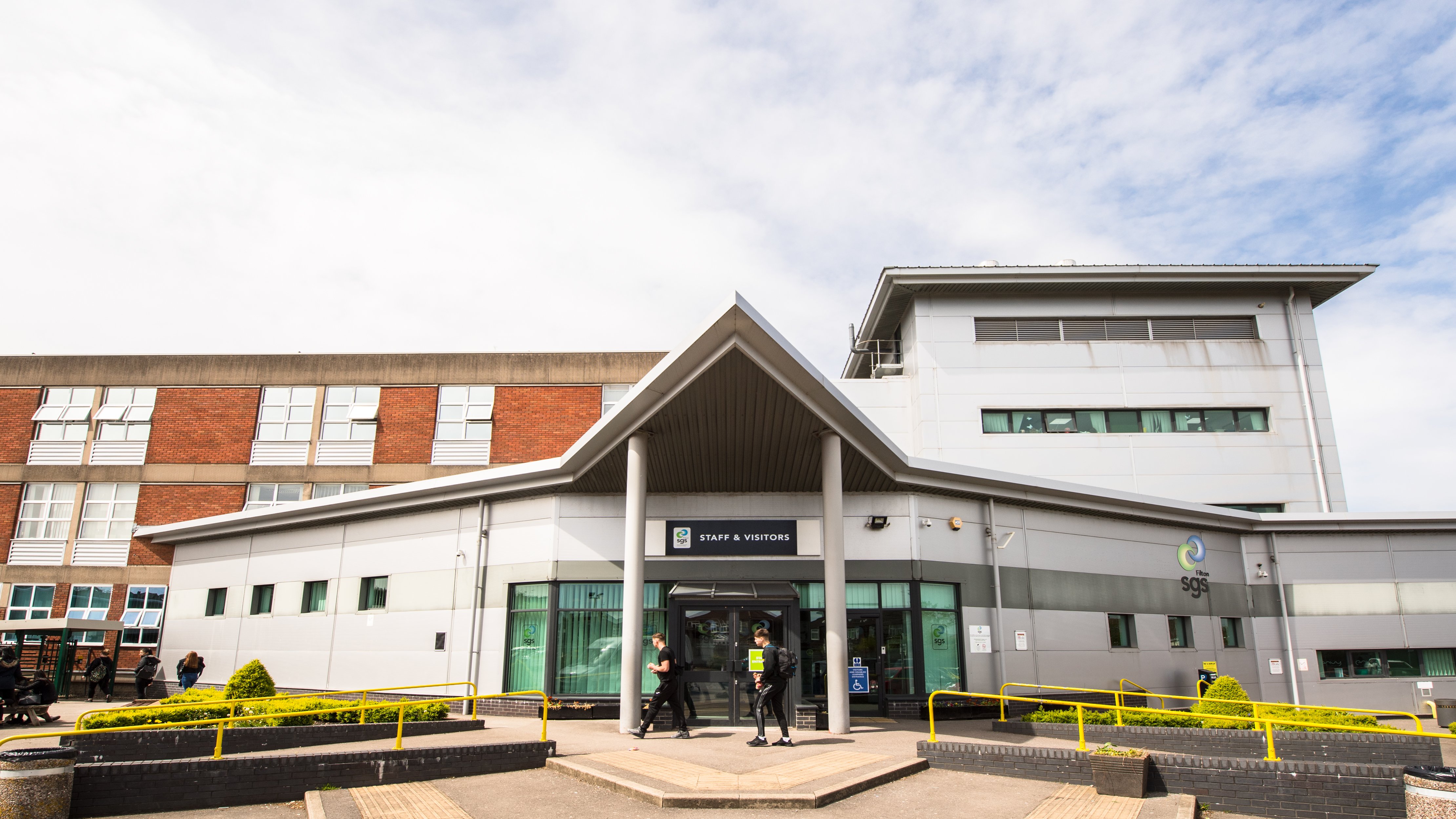SGS College Sustainability & Biodiversity Group
How we plan to be the UK's most sustainable FE College by 2030.
1.0: Vision:
SGS College has a vision to become the UK's most sustainable further education college by 2030. Working with the Corporation, we aim to update our mission statement to embrace both the environmental well-being of our communities and to ensure that the provision we offer is sustainable. We also aim to be carbon neutral by 2030. This plan also aligns to the Department for Education's Draft Sustainability & Climate Change Strategy (November 2021).

1.1: Our Values in Achieving Our Vision:
In achieving our vision, it is important that we inspire and enthuse all stakeholders, with a specific focus on learners, so that they understand what we are trying to achieve and the long-term benefits of our ambition. We aim to educate in our approach so that the value of our commitment to our vision is felt beyond our immediate stakeholders but also has a lasting impact due to the development of a culture within the College that embraces sustainability in all elements of the business as well as being recognised as central to all decision making.

By embracing sustainability into the College's mission statement, we are demonstrating a commitment at all levels to sustainability and leaders and managers will lead by example and ensure that it is a core element of business planning, as well as embedded within curriculum planning. The College's sustainability group, with representation from all levels of the College staff, corporation and student cohort, will lead on delivering the operational objectives set within this plan, whilst the Corporation will hold the Executive Team to account for achieving the annual sustainability key performance indicators.

Giving learners the knowledge, skills and motivation to make a difference and to value our approach to sustainability and their long-term commitment to our environment is integral to our objectives within this plan.
To achieve our long-term goals, we will continue to work in collaboration with external partners in order to ensure we take advantage of relationships in order to be at the forefront of the low-carbon agenda and long-term educational and business approaches to sustainability.
Ensuring that we continually strive to develop our estate and the way we run our operations in the most sustainable way is our final key value in delivering our plan.
2.0: Key Objectives:
The following objectives will enable us to achieve our vision, working to the acronym of 'CEDAR' Communicate, Educate, Deliver, Analyse, Resource:
Communicate:
We will:
- Produce a communications plan for sustainability across the College with an associated sustainability policy that has been developed in consultation with key stakeholders
- Engage staff and learners through our Sustainability and Biodiversity Group
- Share our sustainability performance annually with our staff, learners, suppliers and external stakeholders through an annual sustainability performance statement on our website
- Share experience and knowledge of sustainability with the wider community and contribute to the debate on sustainability by attending events held by local Climate Action Networks and Events such as COP 26 Glos
- Establish relationships with partners and employers with sustainability credentials
- Clearly communicate how the College recycles at all waste points and provide recycling bins in all offices/classrooms in addition to general waste bins
- Ensure suppliers have a sustainability policy
- Partner with the GFIRST LEP Energy Group and WECA to make strong links with leaders in sustainable power
- Continue to promote and develop [email protected] for any staff, learner or external partners to raise, report or suggest sustainability ideas and issues

Educate:
We will:
- Embed sustainability into programmes of learning and schemes of work.
- Embrace within the College's Education Plan, a coherent curriculum plan for environmental sustainability and natural history that tackles climate change and carbon reduction (in support of the UN Sustainable Development Goal 8 'Promote sustained, inclusive and sustainable economic growth, full and productive employment and decent work for all).
- Support the Government's National Education Nature Park scheme and increase the biodiversity of our campuses
- Deliver a sustainability certificate within full-time courses and support the delivery of the Government's 'Climate Leaders Award'.
- Make sustainability a focus of the annual Raising and Giving weeks (RAG)
- Move learning materials online and reduce copiers/printers from the organisation
- Work with awarding bodies to help prepare curriculum areas for paper-free assessment and the move towards digital portfolios and electronic evidence
- Support staff development initiatives that enable leaders and managers to have the sufficient skills and up-to-date knowledge of environmental plan.
- Embrace personal sustainability approaches into the annual conversation process
- Support the Students Union, through enrichment activities, to develop an Eco Council that feeds directly into the Sustainability Group
- Focus the activities of the Students 'RAG week' and 'Welcome Fest' on sustainability activities and projects
- Endeavour to become sector leaders in the development of low-carbon training programmes and Green Skills and to develop our Berkeley Campus as a national leader in the delivery of sustainable vocational training programmes.

Deliver:
We will:
- Promote our Sustainability vision as part of our employee recruitment approach in order to attract future talent that have the same shared vision
- Develop a car sharing scheme, alongside EV charging points for all electric vehicles including bicycles and scooters, and encourage cycle to work schemes
- Enhance bicycle and scooter storage on campus and the provision of changing rooms and lockers to support staff/learners who utilise this mode of transport to campus
- Embrace a flexible working from home policy to reduce unnecessary journeys
- Automate systems to avoid paper, postage and waste
- Embrace a tree planting scheme across the College's estate (in support of the UN Sustainable Development Goal 15 'Protect, restore and promote sustainable use of terrestrial ecosystems, sustainably manage forests, combat desertification, and halt and reverse land degradation and halt biodiversity loss)
- Encourage green spaces and wild flower habitats on all sites
- Eliminate all single use plastic from our campuses
- Consider establishing a College freecycle site for staff and learners to recycle redundant items
- Have increased ethically sourced animal-based products in the college and consider environmentally sustainable alternatives where appropriate aiming that 50% of our catering products are plant-based (in support of the UN Sustainable Development Goal 2 'End hunger, achieve food security and improved nutrition and promote sustainable agriculture')
- Work with commercial partners on activities and initiatives that enable carbon reduction schemes.
Analyse:
We will:
- Make further progress along the Association of College's Roadmap to Climate Action and the Department for Education's Sustainability & Climate Change: a draft plan for the education & children's services systems - November 2021. So far, the college has completed many of the emerging actions and we have all the building blocks and aspiration in place to progress to be a leading sustainable institution within the next few years.
- Have met all the requirements of the AoC Good Governance Guidance in respect of Environmental Sustainability
- Undertake an annual carbon assessment report in order to provide key data for our key performance indicators
Resource:
We will:
- Where viable ensure contractors and suppliers have a Sustainability Policy before they can be entered onto our systems.
- Have renewable energy, efficiency and storage technologies deployed on the SGS Estate (in support of the UN Sustainable Development Goal 7 - Ensure access to affordable, reliable, sustainable and modern energy for all)
- Continue to upgrade the estate with energy efficient approaches with the aim of all campuses working towards becoming Carbon net zero
- Ensure all meetings, as standard, are online meetings to further reduce unnecessary travel and to invest further in video conferencing facilities.
- Reduce single occupancy vehicle use to and between our campuses, encouraging walking, cycling and the use of public transport where possible as principal modes of commuting and business travel for staff, students and visitors.
- Ensure all capital build projects are planned to be carbon neutral in line with the ethos employed in our recent Brunel Centre project (in support of the UN Sustainable Development Goal 9 - Build resilient infrastructure, promote inclusive and sustainable industrialisation and foster innovation)
- Support the Berkeley Green Campus to act as a catalyst for developing links as well as an exemplar of work on creating a sustainable Campus. The Campus continues to do this having hosted the Active Building Centre.
- Consider the development of a dedicated Sustainability lead
3.0: Key Performance Indicators 21/22 - 23/24:
Annually, the College Executive will present the following KPIs to Corporation for review in order to measure our progress towards our Sustainability vision:
KPI |
Aim |
Measure |
Target |
|---|---|---|---|
|
Biodiversity |
Increase the amount of biodiversity spaces on our campuses |
Initial base line assessment of existing amount of 'green' space across college |
10% increase annually |
|
Engagement |
Increase the student engagement in sustainability. |
Start of year and end of year student surveys |
20% increase between start and end of year survey |
|
Increase the staff approval score for the College's approach to sustainability |
Annual employee survey |
80% satisfaction rate |
|
|
Transport |
Reduce CO2 from all diesel and petrol car journeys to, from and between campuses. Measure is C02 based on estimate of number of car journeys and average distance. Includes SGS fleet mileage, mileage claims, vehicle transaction reports (CMP) and travel survey results. |
Reduce by 20% annually from the College's baseline position of 118 tonnes |
|
|
Supply chain |
Reduce C02 from supply Chain and contractors. |
Benchmark against sector date |
10% reduction annually |
|
Waste |
Reduce C02 from waste |
Measure is direct input of CO2 from Annual SGS Carbon Footprint Report. |
Reduce by 10% annually from baseline position of 32 tonnes |
|
Utilities |
Reduce C02 from utilities. |
Measure is input from electricity, gas, oil and water elements of the Annual SGS Carbon Footprint Report. |
Reduce by 10% from baseline position of 436 tonnes |
SGS College
SECR 2022/23
Energy & Carbon Report
| Reporting Year Start Date | 1/8/2022 |
|---|
| Energy Consumption (All kWh) | UK Energy Consumption 19/20 (kWh) | UK Energy Consumption 20/21 (kWh) | UK Energy Consumption 21/22 (kWh) | UK Energy Consumption 22/23 (kWh) |
|---|---|---|---|---|
| Fossil Fuels in stationary combustion | 2,041,887 | 3,089,175 | 2,437,708 | 1,998,219 |
| Fossil fuels in owned / operated transport | 190,328 | 155,908 | 273,407 | 227,598 |
| Purchased Electricity | 2,895,515 | 3,171,375 | 3,237,606 | 3,212,038 |
| Energy from the fuel used in personal / hire cars for business use ("Greyfleet") | 197,426 | 50,416 | 128,853 | 138,673 |
| Total Energy Consumption | 5,325,156 | 6,466,874 | 6,077,573 | 5,576,528 |
| Footprint Breakdown | Scope | UK Carbon Footprint "Locational Based" (tonnes CO2e) | UK Carbon Footprint "Market Based" (tonnes CO2e) | ||||||
|---|---|---|---|---|---|---|---|---|---|
| 19/20 | 20/21 | 21/22 | 22/23 | 19/20 | 20/21 | 21/22 | 22/23 | ||
| Emissions from fuels used in stationary combustion | 1 | 383 | 568 | 445 | 366 | 383 | 568 | 445 | 366 |
| Emissions from fuels used in owned / operated transport | 1 | 46 | 37 | 65 | 54 | 46 | 37 | 65 | 54 |
| Emissions from purchased Electricity consumption | 2 | 675 | 673 | 626 | 665 | 0 | 0 | 188 | 665 |
| Emissions from the fuel used in personal / hire cars for business use | 3 | 62 | 16 | 30 | 32 | 62 | 16 | 30 | 32 |
| Total Footprint | 1,165 | 1,293 | 1,166 | 1,116 | 490 | 620 | 728 | 1,116 | |
| Intensity Ratio | "UK Intensity - Market basis kgCO2 / Enrolled student" | |||
|---|---|---|---|---|
| 19/20 | 20/21 | 21/22 | 22/23 | |
| Footprint per Enrolled student | 120.13 | 130.39 | 180.19 | 282.80 |
Energy Efficiency Action
SGS has an increasing focus on energy efficiency within its estate. They have received grant funding for a heat decarbonisation project at their sites and work for this has begun this year.
Calculation Methodology
"The Greenhouse Gas (GHG) emissions associated with the operations of South Gloucestershire and Stroud College have been quantified according to the GHG Protocol, Corporate Accounting and Reporting Standard following the operational control approach. Seven types of greenhouse gases are included in the Kyoto Protocol and are required for reporting under the GHG Protocol. They are carbon dioxide, methane, nitrous oxide, hydrofluorocarbons, perfluorocarbons, sulphur hexafluoride, and nitrogen trifluoride. The total emissions are measured in metric tonnes of carbon dioxide equivalent.
This report covers the activities of the SGS college activities only and excludes those of the academy and commercial services. The SECR required data is based on energy consumption at the Stroud, Filton North, Filton South, WISE, H38, and Queen's campuses, plus business travel in private vehicles. Historically, there have been some College units at Berkeley, however this has not been the case for the previous two years.
There are no joint ventures or similar investments in other organisations or UK-based locations beyond those listed above.
The majority of the financial year took place in 2023 and uses 2023 BEIS Greenhouse Gas conversion factors as stipulated by BEIS. The SECR regulations require publishing the locational footprint, which requires the use of carbon conversion factors suited to the locality of consumption. However, this would not reflect the impact of renewable electricity purchasing, and therefore, the "Market based" footprint is also presented per the GHG protocol. The intensity factor has been calculated using the "Market based" footprint."
"The electricity consumption has been sourced from monthly electricity data. Gas consumption is based on monthly billed consumption.
The use of private vehicles for business purposes has been calculated using the organisation's expense data for average vehicles of unknown fuel types.
In the 2021/22 financial year, due to financial reasons there was a choice to move off a green electricity contract. As this switch happened in March 2022, renewable electricity procurement was still represented in last year's intensity metric. However, it has caused a large increase in CO2e/student this financial year.
Natural gas consumption has continued to reduce, in part through tighter operational control and in part due to improved monitoring practices and reduced reliance on estimated meter readings."
